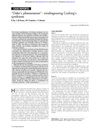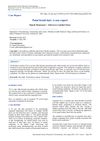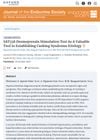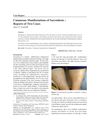 November 2023 in “The journal of investigative dermatology/Journal of investigative dermatology”
November 2023 in “The journal of investigative dermatology/Journal of investigative dermatology” The article concludes that creating a detailed map of normal human skin at the single-cell level is important.
 11 citations,
October 2003 in “Postgraduate Medical Journal”
11 citations,
October 2003 in “Postgraduate Medical Journal” Doctors often diagnose Cushing's syndrome late, which worsens symptoms; earlier detection is needed.
2 citations,
July 2021 in “Journal of feline medicine and surgery open reports” A diabetic cat with another gland issue got better after treatment with cabergoline, no longer needing insulin.
 November 2024 in “The Medical Journal of Australia”
November 2024 in “The Medical Journal of Australia” Long COVID has severely affected a couple's health, finances, and social life.
 June 2021 in “International journal of research in dermatology”
June 2021 in “International journal of research in dermatology” Shaving and avoiding brushing improved the patient's beard hair condition.
 November 2013 in “Dermatologic Clinics”
November 2013 in “Dermatologic Clinics” The document summarizes the latest trends and advancements in cosmetic dermatology.
 36 citations,
January 2010 in “Human & experimental toxicology”
36 citations,
January 2010 in “Human & experimental toxicology” Eating paradise nuts led to selenium poisoning, causing nausea, hair loss, and other symptoms in two women.
 14 citations,
November 2011 in “Journal of The American Academy of Dermatology”
14 citations,
November 2011 in “Journal of The American Academy of Dermatology” Alopecia Areata Incognita causes widespread hair thinning, and treatment with systemic corticosteroids and psychiatric support can lead to remission.
 1 citations,
September 2022 in “BioNanoScience”
1 citations,
September 2022 in “BioNanoScience” Tofacitinib can help hair grow back in alopecia patients but hair loss might return if the dose is lowered.
 1 citations,
August 2023 in “Journal of the American Academy of Dermatology”
1 citations,
August 2023 in “Journal of the American Academy of Dermatology” Dermatologists should be aware of and manage alopecia risks from certain cosmetic procedures.
Hair can naturally regain color after greying, and this change may be linked to stress levels.
 May 2021 in “Journal of the Endocrine Society”
May 2021 in “Journal of the Endocrine Society” A patient produced cortisol after adrenalectomy, possibly due to residual tissue or other body parts making steroids.
 1 citations,
August 2007 in “Indian Journal of Pediatrics”
1 citations,
August 2007 in “Indian Journal of Pediatrics” A girl with symptoms like an autoimmune disorder actually had HIV and a fungal infection, which was hard to diagnose and treat, leading to her death.
4 citations,
May 2013 in “JAMA Facial Plastic Surgery” Endoscopic brow-lift is effective and well-tolerated, with high patient satisfaction and improved appearance.
 April 2021 in “Anatolian current medical journal :”
April 2021 in “Anatolian current medical journal :” A patient developed hair loss after hepatitis C treatment with sofosbuvir and ribavirin.
 October 2023 in “Journal of the Endocrine Society”
October 2023 in “Journal of the Endocrine Society” The desmopressin stimulation test helped identify an adrenal cause for a patient's Cushing's syndrome.
 March 2017 in “BIRDEM Medical Journal”
March 2017 in “BIRDEM Medical Journal” Sarcoidosis can cause various skin issues, making diagnosis difficult.
 January 2017 in “IMC Journal of Medical Science”
January 2017 in “IMC Journal of Medical Science” A rare endocrine disorder, APS 1, was diagnosed in a 26-year-old man in Bangladesh.
 23 citations,
October 1971 in “BMJ”
23 citations,
October 1971 in “BMJ” Stopping the pill and giving birth both caused hair loss.
 February 2023 in “Journal of clinical medicine research”
February 2023 in “Journal of clinical medicine research” Zinc acetate hydrate may help reduce fatigue and hair loss in post-COVID-19 patients.
ILC1-like cells may contribute to hair loss in alopecia areata.
 4 citations,
March 2013 in “Neuropsychiatric Disease and Treatment”
4 citations,
March 2013 in “Neuropsychiatric Disease and Treatment” A woman with anorexia and Cushing's syndrome improved after tumor removal, highlighting the need to consider hormonal issues in psychiatric conditions.
 October 2018 in “Emergency medicine news”
October 2018 in “Emergency medicine news” A 65-year-old man with sudden abdominal pain and seizures was diagnosed with a rare, non-traumatic splenic rupture and treated without surgery.
 August 2022 in “Deleted Journal”
August 2022 in “Deleted Journal” Nutritional education reduces chemotherapy side effects and improves health in breast cancer patients.
1 citations,
November 2016 in “Frontiers in neurology” Steroid treatment improved both gut and nerve symptoms in a man with Cronkhite–Canada syndrome.
10 citations,
December 2018 in “Internal Medicine” Myasthenia gravis can affect both motor and non-motor systems due to immune system issues.
 1 citations,
October 1971 in “The BMJ”
1 citations,
October 1971 in “The BMJ” The document suggests that hair loss after stopping birth control may be similar to post-pregnancy hair loss and could recur with future pregnancies.
 28 citations,
January 2007 in “Dermatology”
28 citations,
January 2007 in “Dermatology” Chemotherapy can cause rapid, extensive hair loss, with patterns varying between individuals.
 5 citations,
July 2018 in “Pediatrics”
5 citations,
July 2018 in “Pediatrics” A 3-year-old girl developed scurvy symptoms that improved with vitamin C but relapsed when supplementation stopped.
 193 citations,
January 2015 in “International journal of trichology”
193 citations,
January 2015 in “International journal of trichology” Dermatologists need to understand hair products to treat hair and scalp issues better.
























